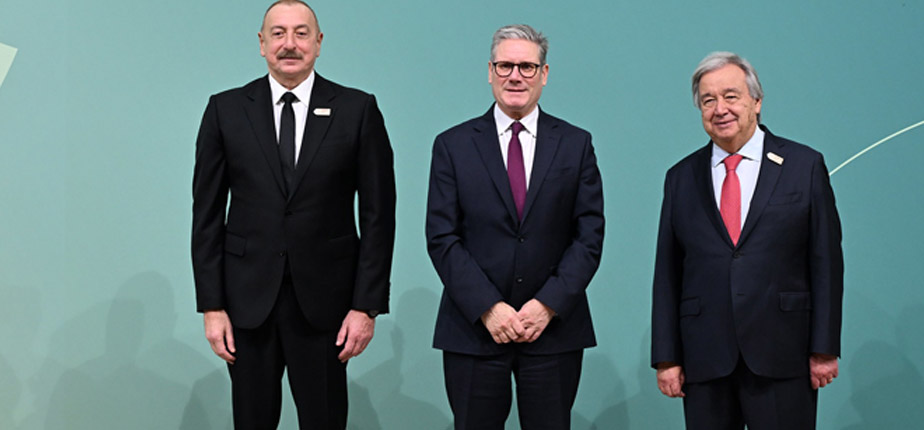
This year’s UN climate conference, COP29, was hosted in Baku, the capital city of Azerbaijan, a country whose economy relies heavily on oil and gas exports. President Ilham Aliyev opened the conference with a notable speech, stating that all natural resources, including oil and gas, are a “gift from God,” setting the tone for a conference where fossil fuel deals were discussed alongside seminars about the importance of reducing carbon emissions.
While COPs remain an important forum for world leaders and their delegations to negotiate on how nations will reduce their greenhouse gas emissions, each year fewer and fewer prominent heads of state attend. This year’s COP began days after the U.S. re-elected President Donald Trump, who pulled the U.S. out of the Paris Climate Agreement in 2017 and aimed to turbocharge domestic fossil fuel production. President Biden did not attend COP29 but sent high-level climate officials and cabinet members who promoted the carbon-reducing benefits of the Inflation Reduction Act, which offers subsidies for clean energy production.
Mia Mottley, Prime Minister of Barbados, has become a force at climate conferences and gave a speech offering a 7-point plan focused on opening financing mechanisms for vulnerable developing nations, holding accountable countries that made funding commitments, and dealing with methane, which has a much greater warming potential than CO2.
COP29 somewhat overlapped with the G20 in Rio de Janeiro. UK Prime Minister Keir Starmer attended both events and launched the Global Clean Power Alliance at the G20. Brazil, Australia, Barbados, Canada, Chile, Colombia, France, Germany, Morocco, Norway, Tanzania, and the African Union signed onto the alliance, which “will work together and share expertise with the goal of meeting the COP28 commitments to triple renewable energy and double energy efficiency.” During his speech in Baku, Starmer emphasised that “without climate security, there is no national security, no economic security, and no global security,” framing the climate crisis as a significant opportunity for UK businesses.
Finance
The focus of COP29 was finance for mitigation, adaptation, and loss and damage. Since the UNFCCC’s founding in 1992, developed countries have been expected to help fund developing countries’ climate adaptation plans, and over the years, multiple funds have been started with this aim. The Muslim News spoke with Dr. Carl-Friedrich Schleussner, science advisor to Climate Analytics, who observed that this COP was the first where “finance is so central,” and discussed difficulty with the one-size-fits-all approach to finance for Global South nations. Previous annual funding goals have not been reached, and many developing countries are reluctant to take on more debt from global banking institutions.
Agreements
Early in the talks, participants reaffirmed the Global Cooling Pledge, launched in Dubai at COP28, which aims to reduce cooling-related emissions by 68% by 2050 and increase the efficiency of air conditioners by 50%. China, the U.S. and Azerbaijan convened over methane, pledging $2 billion in grant funding, taking regulatory steps to reduce methane emissions in critical sectors like waste management, and launching the Nitrous Oxide Assessment to track and reduce N2O emissions, which largely come from the agricultural sectors.
Process Criticisms
The cumbersome nature of negotiations prompted climate leaders to draft an open letter calling for reforms to the COP process. The 7-point document suggested implementing strict eligibility criteria for hosting a COP to ensure alignment with the conference’s goals. The fact that recent COP hosts have been so heavily entrenched in the fossil fuel industry has garnered widespread criticism. The letter called for streamlining the COP process with smaller and more frequent meetings. COP commitments are not legally binding, meaning there is little accountability for countries that do not meet their targets, apart from international peer pressure.
Other points in the letter included robust tracking of climate finance, amplifying the voice of authoritative science, recognising the connections between poverty, inequality, and planetary instability, and enhancing equitable representation, as fossil fuel lobbyists currently outnumber the voices of climate-vulnerable populations.
The Muslim News interviewed Kim Ross, founder of ReThink Energy Florida, a nonprofit advocating for a transition to clean energy and created the “Upper Limit Project” to offer a sea level rise metric, which is more tangible than the 1.5C warming goal frequently cited by scientists. Ross, who was attending COP for the first time, agreed on the need for reform. Upon observing a delegation deliberating on a draft proposal for climate financing, she expressed being, “floored that this was the process,” as over 100 people were “wordsmithing” the document.
The conference was meant to end on November 22, but as has become the norm in recent years, talks went overtime, with developing and small island nations delegations walking out of negotiations over climate finance. The approved final text allocates $300 billion annually for vulnerable nations until 2035, an increase from $100 billion. The text called on the private sector and international banking institutions to support the initiative, so that governments would not be solely responsible, and financing could be scaled up to $1.3 trillion annually by 2035.
The inclusivity of COPs offers nations with disparate views and economic situations the opportunity to convene on a pressing global issue but only allows for the most agreeable non-binding solutions when scientists warn that extreme actions are needed to tackle climate change. In response to whether the record-breaking storms in recent months (Helene, Milton, Beryl, Trami, Man-yi) caused more urgency in climate discussions at COP29, Dr Schleussner said, “Not so much … it has had a chilling effect … we see what the consequences of 1.3 degrees of global warming are, and that we are not prepared for them.”
Photo: November 12, 2024: (L-R) Azerbaijani President Ilham Aliyev, UK Prime Minister Keir Starmer, and UN Secretary-General António Guterres at the COP29 Conference, Baku Azerbaijan.
(Credit: COP29)
Sarah Sakeena Marshall, Data Associate